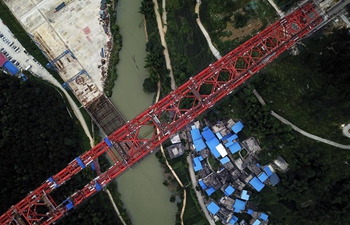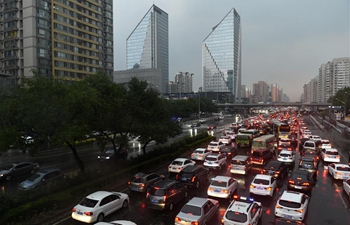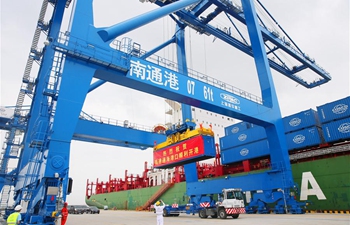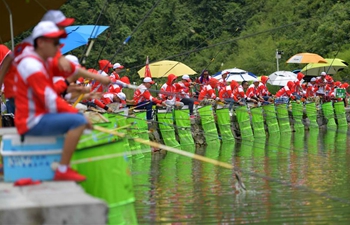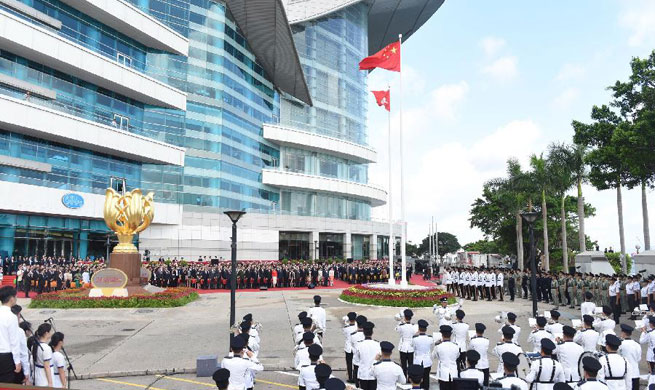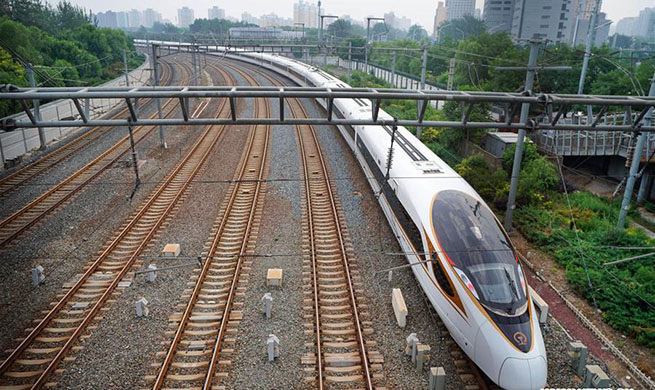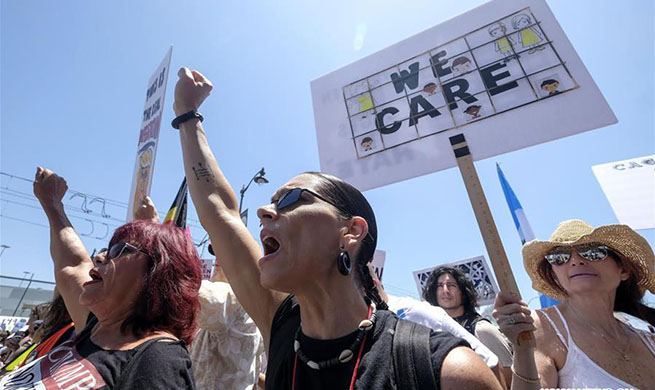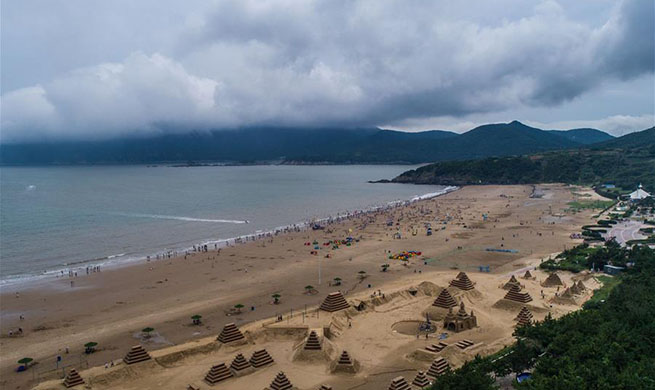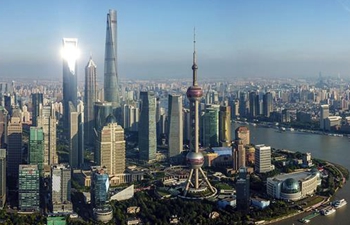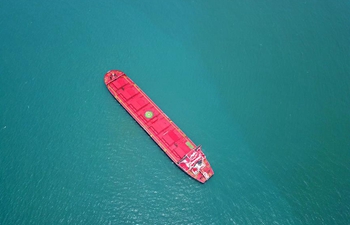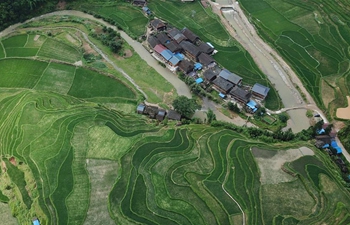by Murad Abdu
ADEN, Yemen, July 1 (Xinhua) -- Uneasy calm returned to the strategic port city of Hodeidah on Sunday after weeks of intense fighting between the Iranian-backed Shiite Houthi rebels and Yemeni government forces supported by the Saudi Arabia-led coalition.
An officer of the Southern Al-Amaliqah (Giants) Brigades told Xinhua on condition of anonymity that their leaders received orders from the general command of Saudi-led coalition to halt the anti-Houthi military operation.
"Our soldiers stopped their progress and positioned in Hodeidah's outskirts after receiving orders from the military leadership. (There is) no armed confrontation on ground at the moment and only anti-bomb disposal units continued in dismantling landmines planted by Houthis."
The Emirati Red Crescent and other humanitarian workers are continuing in providing relief items and food for people in government-controlled areas in Hodeidah, the source said.
A Hodeidah-based citizen told Xinhua by phone saying that "(there is) no airstrike or shelling and most areas in Hodeidah are calm now but we do not know exactly what is going to happen during the next hours."
The relative calm comes after the United Arab Emirates (UAE) operating, as part of the Saudi-led coalition, announced a pause in the military campaign against the Houthis in the Red Sea coast city of Hodeidah to give a chance to UN peace efforts.
The UAE Minister of State for Foreign Affairs Anwar Gargash tweeted that the UAE welcomes "continuing efforts" by UN Special Envoy Martin Griffiths to achieve an unconditional Houthi withdrawal from Hodeidah.
"We have paused our campaign to allow enough time for this option to be fully explored," Gargash said.
He stressed that the coalition's operation to liberate Hodeidah "is calibrated to minimize civilian casualties and maximize pressure on Houthis. It has succeeded in liberating the airport and forcing the Houthis to make concessions."
"Whether the Houthis are engaging seriously with this process or using it as a tactic to buy time" needs to be observed, he added. "They have declared their intention to recapture entire Yemen, in defiance of the United Nations."
Meanwhile, the Houthis claimed resisting the Saudi-led operation and described the pause announced by the UAE as "a clear failure to capture Hodeidah" and vowed to continue fighting against the Yemeni government forces regardless of the declared halt.
Several armored UAE vehicles were destroyed by Houthi fighters during the previous battles in Yemen's western coast areas and Hodeidah, according to a Houthi source.
Local military experts feared that the Houthi rebels may get benefits by exploiting the fighting pause announced by UAE in constructing fortifications and bringing more reinforcements from Sanaa to Hodeidah.
Ali Naji Obeid, a strategic military expert based in Aden, told Xinhua that "the Houthis started to rearrange their ranks and the absence of warplanes will allow them to receive more reinforcements and weapons from other areas including the capital Sanaa."
"Pausing the military operation to give a chance for negotiation is a wise decision but it is dangerous at the same time. Houthis used previous cease-fire periods as an opportunity to expand and advance militarily," Obeid said.
He said that "any upcoming deals must clearly state the Houthis full withdrawal from Hodeidah, otherwise the Iranian-backed group will consider it as a victory against the Yemeni government."
Sources told Xinhua that Griffiths might arrive in Aden on Monday to meet the internationally-backed President Abdu-Rabbu Mansour Hadi for the second time regarding Hodeidah.
Last week, Griffiths met President Hadi in Aden for the first time and Houthi officials in Oman, and expressed his hopes to make Hodeidah the first step towards peace in Yemen instead of a step further towards war.
The UN envoy stressed that solution to the Hodeidah crisis was tied up with a restart of political negotiations, and the Houthi leadership accepted to give the UN a lead role in supervising the city's port.
However, President Hadi strongly rejected the proposal and insisted on complete withdrawal of Houthi fighters from the entire province of Hodeidah and its port.
"Hadi told the UN envoy that the presence of Houthi militants in Hodeidah is totally refused and no longer acceptable," a government source told Xinhua on Wednesday.
The Yemeni government said in a statement last week "securing the city of Hodeidah is part and parcel of the solution and is the only way to eliminate threats against international navigation at the Red Sea. The Houthis use the city -- not only the port -- to launch their attacks and threaten international shipping lanes."
The statement said "the Hodeidah initiative is a package deal that should be preserved as such for it to work. It consists of a full withdraw from the city and port, handing over the port to forces from the ministry of interior, unfettered access for humanitarian and commercial goods."
The Yemeni government accused the Houthis of violating the international laws by digging trenches and building barricades all over Hodeidah, cutting water systems and roads, as well as hiding their tanks and armored vehicles near houses, hospitals, and hotels, and using civilians as human shields.
Over 45,000 Yemenis fled from war-torn areas in Hodeidah since the UAE-led offensive against Houthis began on June 13, according to humanitarian organizations.
Hodeidah is the single most important point of entry for food and basic supplies to Yemen's northern provinces controlled by Houthis.
Close to 70 percent of the country's imports, including commercial and humanitarian goods, enter the impoverished Arab country through Hodeidah and Saleef, a coastal village in western Yemen.
The Hodeidah port, which Iran-backed Houthis captured in October 2014, serves as a key source of strength for Houthi militias because it is regarded as a lifeline for many Yemenis.
The United Nations warned that the battles to liberate Hodeidah, which has the highest poverty and malnutrition rates in war-torn Yemen, could lead to the death of 250,000 people.





